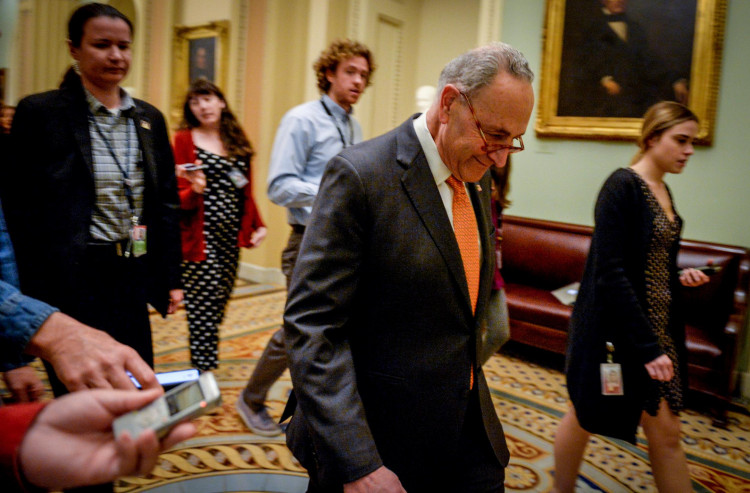The Senate passed a stopgap spending bill Friday to prevent a government shutdown, with ten Senate Democrats joining Republicans to push the measure forward. The move has ignited internal party tensions, as progressives accuse Senate Minority Leader Chuck Schumer (D-N.Y.) of caving to Republican demands rather than forcing a confrontation over federal spending cuts backed by President Donald Trump and billionaire Elon Musk.
The key procedural vote, which required 60 votes to advance, passed 62-38, with Sen. Rand Paul (R-Ky.) as the only Republican voting against it. The final vote to send the bill to Trump's desk for signature passed 54-46. The measure funds the government through September 30 and largely maintains 2024 spending levels, with additional funding allocated for defense and nearly $500 million for Immigration and Customs Enforcement (ICE).
Schumer secured a commitment from Republican leadership to hold a separate vote to protect Washington, D.C.'s budget from a $1 billion cut included in the House version of the bill. Despite this concession, Democratic lawmakers, particularly in the House, remain frustrated that party leadership did not use the spending deadline as leverage to block proposed cuts to Medicaid and social programs.
After days of internal debates, Schumer publicly defended his decision to support the bill. "I'm not going to exacerbate" economic uncertainty, said Sen. Catherine Cortez Masto (D-Nev.), one of the Democrats who voted in favor of the legislation. She warned that a government shutdown would give Trump and Musk "more authority to cherry-pick" which agencies to shut down and could cost the economy billions.
Trump praised Schumer's decision, writing on Truth Social, "Congratulations to Chuck Schumer for doing the right thing-Took 'guts' and courage!" He called the move "a really good and smart move."
The bill's passage in the House earlier in the week also revealed stark divisions among Democrats. Every Republican except Rep. Thomas Massie (R-Ky.) supported the bill, while nearly all House Democrats opposed it, except Rep. Jared Golden (D-Maine). Speaker Mike Johnson (R-La.) managed to secure enough votes despite opposition from some conservative Republicans, forcing Senate Democrats to either accept the compromise or risk a government shutdown.
In response, House Democrats, led by Minority Leader Hakeem Jeffries (D-N.Y.), announced a "Day of Action" on Tuesday to rally opposition against what they describe as "the largest Medicaid cut in our nation's history." Jeffries labeled the bill "an attack on veterans, families, seniors, and everyday Americans," vowing to fight back against Republican spending priorities.
"The ongoing Republican assault on the economy, healthcare, the social safety net, and veterans' benefits requires all of us working together in the weeks and months to come," Jeffries said. He added that House Democrats will work with governors, local officials, unions, and advocacy groups to mobilize against the legislation.
Schumer's role in advancing the spending bill has sparked internal party tensions. Jeffries has so far refused to publicly express confidence in Schumer's leadership after the vote, reflecting growing frustration among House Democrats.
"Our party is not a cult, we are a coalition," Jeffries said. "On occasion, we may strongly disagree about a particular course of action. At all times, Democrats throughout the nation remain determined to make life better for everyday Americans and stop the damage being done by Donald Trump, Elon Musk, and House Republicans."
Senate Democrats who opposed the bill have warned that it could set a precedent for further Republican-led budget cuts. With the government now funded through the end of the fiscal year, the next major spending fight is likely to take place this fall, when lawmakers will again have to negotiate funding priorities for 2025.






